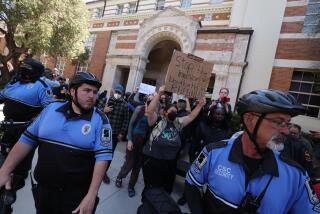TV Tunes Out Sacramento : Legislative News Called Too Expensive to Cover
The day after the last out-of-town TV news bureau was shut down and state capital correspondent Ginger Rutland and her producer-husband Don Fields were fired, the couple got a panic call from their former employer, KRON-TV in San Francisco.
It was the first week of November and real news--not that stuffy, dull legislative dross that blows through the halls of the state Capitol--was happening in Sacramento.
“They wanted us to go out and cover the body search at the landlady’s house. You know the one who was accused of doing in all the old men?” said Fields. “Everyone wanted that story. Nobody wants to know about budgets or bills that might raise their taxes or ruin their water.”
Indeed, TV stations throughout the state--including KABC-TV Channel 7, KNBC Channel 4 and KCBS-TV Channel 2 in Los Angeles--dispatched correspondents to Sacramento that Friday afternoon in November to cover the Dorothy Puente “Arsenic and Old Lace” case, because not a single out-of-town TV station in California now has its own bureau here.
“It’s an absolute outrage,” said Harry Snider, West Coast director of Consumer’s Union. “We have a state that is supposed to have the 10th largest economy in the world and not a single TV station covering how it’s governed.”
With the shutdown of the KRON bureau, only TV reporters from Sacramento’s own stations cover legislative news on a regular basis.
“California is only one of three states in the country that don’t provide live coverage of debates in their state legislatures. Wyoming and Montana are the others,” said Tracy Westen, a USC professor who is writing a book on media coverage of state and local government in California (see accompanying article).
“Democracy is eroding in California,” Snider said. “Government does not work for the people, and the reason government doesn’t work is that public officials are able to escape the spotlight of public attention.
“All of them, from the governor on down, know that they can ride out a print story or a radio sound bite on the Michael Jackson show. But none of them want to be caught giving away the farm on the six o’clock news in Los Angeles or San Francisco.”
While TV stations have been pulling out, the state’s newspapers have been increasing capital coverage, according to a spokesman for Assembly Speaker Willie Brown (D-San Francisco). Currently, 30 newspapers and wire services have bureaus here.
Both Gov. George Deukmejian’s office and state Senate President Pro Tem David Roberti’s office are disturbed by television’s departure from the scene.
“The shutdown of the KRON bureau really is the culmination of a very disturbing trend,” said Kevin Brett, Deukmejian’s press secretary.
“What will be missed will be the original reporting and investigative reporting,” said Bob Forsyte, Roberti’s press secretary. “That kind of reporting can only be done with sustained coverage from a bureau. The viewers will miss what will only come to them now through the print media.”
KNBC News Director Tom Capra said the decision to shut down its bureau six years ago was based on financial considerations--determining how limited resources should be allocated.
“The real crux of this is the expense,” he said. “It costs about $100,000 a year to have someone in Sacramento. I would rather spend that money covering the news in Southern California. I’d a helluva lot rather have a bureau in Orange County or even Riverside than in Sacramento.”
Capital veterans such as Rutland and Fields, who have been in Sacramento for 10 years, and KCRA-TV’s Steven Swatt, who has been reporting state government news for nearly 20 years, say the benign neglect of Sacramento can’t be blamed on rising costs.
“Logistically and economically, its’s easier and cheaper than ever before,” Rutland said. “We’ve got videotape. We’ve got satellites. The fact is stations don’t do it because they’d rather put crap on the air.”
“It’s greed,” Swatt said. “You’ll see them send up people for things like the body search or a plane crash, but why aren’t they here when the Legislature’s trying to raise taxes or the CHP wants to upgrade its radar or there are hearings being held on changing school textbooks or day care?”
When he headed the Sacramento bureau for KNBC a decade ago, Steve Mallory says, it used to cost about $250,000 a year for an out-of-town station to maintain a capital bureau.
“Most stations like to have their own person on the scene, but if they can’t, they’ll take anything they can get,” said Mallory.
That’s what Mallory is banking on, at any rate. Last summer he created the Northern California News Satellite service to fill the void left by the TV exodus from the state capital. So far he has 13 subscribers, including KNBC, and several other stations and networks that buy his daily satellite video feeds on a spot basis. Both KCBS and KABC have bought stories from him, he said.
“If they get it for one-tenth the price from us, they’ll take it,” said Mallory, who, like a newspaper wire service, spreads his costs over a number of clients. “Public service isn’t the prime concern of television news anymore. The bottom line is.”
That doesn’t mean he offers second-rate goods, Mallory maintains.
“We’re their bureau in the state capital,” he said. “Our stories are written for a general statewide audience unless we get a specific request from a subscriber to do something. But we give them what they want.”
A recent typical NCNS news day involved covering a press conference on a new drunk driving bill, comment from Gov. Deukmejian on the Armenian earthquake, dedication of the state Vietnam Memorial and a plan authored by the state Department of Social Services to pressure absentee parents to make their child support payments.
“When the story broke about the woman who planted the people in her back yard, we dropped everything else,” Mallory said “It was the only story we did for three or four days. It was the only one our clients wanted.”
Fields is not surprised.
“Why try to inform the public about issues that are going to affect their lives when life can be made so much easier dealing with a car accident or an unexplained shooting or some bizarre thing on ‘Entertainment Tonight’?” he asked.
KNBC’s Capra maintains that his station gets all the state legislative news it needs--from wire reports, selected satellite feeds from Mallory’s NCNS, its Sacramento sister station and elected officials downstate for a visit to their constituents.
If a bill is controversial or of particular interest to Los Angeles audiences, Capra does what his rivals at KCBS and KABC do: He sends a reporter to Sacramento upstate for a few days to get the story.
“There’s not much in Sacramento that we don’t know about,” he said. “I don’t have a problem with the way Sacramento is covered and I don’t think we’re doing a disservice to the public by not following a bunch of rich lobbyists around. How many times can you cover that story?”
Snider’s answer is fast and angry: every day.
“It is amazing to me that legislators spend $100 million every two years to seek legislative office and TV stations don’t think they’re important enough to cover,” he said.
The voters are the ultimate losers, according to Swatt and Rutland.
“All the surveys say that 66% of the population gets its news from the TV,” said Swatt. “If they don’t even know what’s going on up here, that’s frightening.”
“We live in a democracy where public opinion is far more important than ever before,” said Rutland. “The Field Poll and other polls influence legislators. And the initiative process puts more and more power directly into the hands of the public. But the public doesn’t know what’s going on.”
More to Read
Get the L.A. Times Politics newsletter
Deeply reported insights into legislation, politics and policy from Sacramento, Washington and beyond. In your inbox three times per week.
You may occasionally receive promotional content from the Los Angeles Times.






